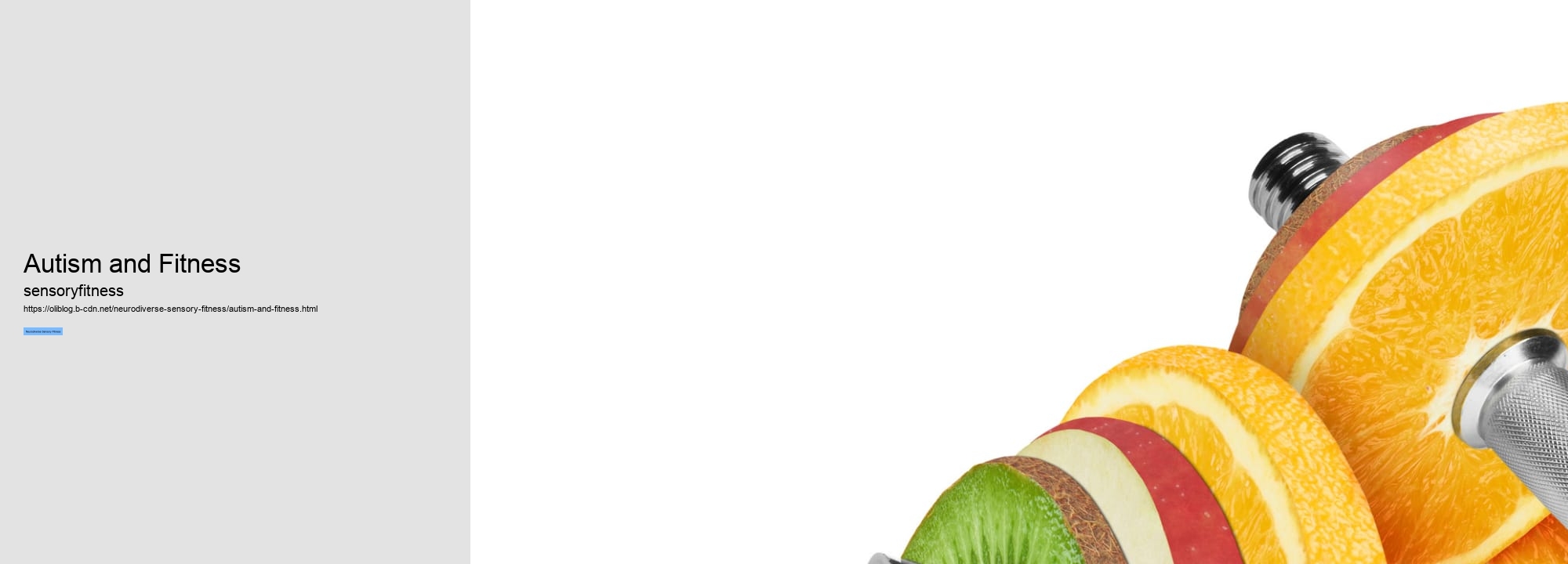

For example, you could use textured mats or foam rollers during exercises, play calming music in the background, or diffuse essential oils to create a soothing atmosphere. It can also be helpful to incorporate sensory breaks throughout the workout. These breaks allow individuals to pause and engage in calming activities when they feel overwhelmed or overstimulated. This could include deep breathing exercises, using fidget toys, or simply taking a moment to rest and recharge. Additionally, it is important to create a safe and supportive environment for individuals with neurodevelopmental disorders during fitness routines. This may involve providing clear instructions, offering positive reinforcement, and being patient and understanding of any challenges that arise.
The Impact of Regular Exercise on Sensory Processing Challenges in Neurodiverse PopulationsRegular exercise has long been touted for its numerous physical health benefits, but recent research has shown that it can also have a significant impact on sensory processing challenges in neurodiverse populations. Sensory processing challenges are common among individuals with conditions such as autism spectrum disorder, attention deficit hyperactivity disorder, and sensory processing disorder. These challenges can manifest in various ways, including hypersensitivity to certain stimuli, difficulty filtering out irrelevant information, and poor coordination of movements. Exercise has been found to play a crucial role in improving sensory processing abilities in individuals with neurodiverse conditions. Physical activity helps to regulate the nervous system by increasing the production of neurotransmitters such as serotonin and dopamine, which are essential for mood regulation and cognitive function.
Furthermore, regular exercise has been shown to enhance proprioception – the ability to sense the position and movement of one's body parts. This improved body awareness can lead to better coordination and motor skills in individuals with neurodiverse conditions. For example, children with autism who engage in activities such as running or swimming may experience improvements in their balance and spatial awareness. Incorporating regular exercise into daily routines can also help individuals with sensory processing challenges regulate their responses to sensory stimuli. By engaging in physical activities that provide deep pressure input or vestibular stimulation (such as jumping on a trampoline or swinging), individuals can learn to better modulate their reactions to external stimuli.
Overall, the impact of regular exercise on sensory processing challenges in neurodiverse populations cannot be overstated. By incorporating physical activity into their daily lives, individuals with conditions such as autism spectrum disorder or ADHD can experience improvements in their sensory processing abilities, coordination, and overall well-being. It is important for healthcare providers and caregivers to recognize the benefits of exercise for individuals with neurodiverse conditions and support them in incorporating regular physical activity into their routines.
Sensory fitness refers to the overall health and well-being of our senses, including sight, hearing, touch, taste, and smell. Just like physical fitness is important for our bodies, sensory fitness is crucial for our minds and overall quality of life.
Our senses play a vital role in how we experience the world around us. They help us navigate through our environment, communicate with others, and enjoy the simple pleasures of life. When our senses are functioning at their best, we are better able to process information, make decisions, and engage in activities that bring us joy. Maintaining good sensory fitness is especially important as we age. As we grow older, our senses naturally decline in sharpness. This can lead to difficulties in perceiving information accurately and may impact our ability to perform everyday tasks.
Furthermore, sensory fitness can also have a significant impact on mental health. Studies have shown that engaging in activities that challenge the senses can improve mood, reduce stress levels, and boost cognitive function. By incorporating sensory exercises into our daily routines, we can promote mental well-being and enhance our overall sense of happiness and fulfillment. In conclusion, sensory fitness is an essential component of overall health and well-being. By taking proactive steps to maintain and improve our sensory abilities through regular exercise and stimulation, we can enhance cognitive function, promote mental health, and enjoy a higher quality of life at any age.
What are the Benefits of Incorporating Sensory Fitness into Your Routine? Incorporating sensory fitness into your routine can have a multitude of benefits for both your physical and mental well-being. Sensory fitness involves engaging all five senses - sight, hearing, taste, touch, and smell - in various exercises and activities to enhance overall health. One of the main benefits of incorporating sensory fitness into your routine is improved cognitive function. Engaging multiple senses at once can help stimulate different parts of the brain, leading to increased focus, memory retention, and problem-solving skills.
Another advantage of sensory fitness is its ability to reduce stress and anxiety. Engaging in activities that stimulate the senses can help calm the mind and provide a sense of relaxation. This can be especially beneficial for individuals who suffer from high levels of stress or anxiety on a regular basis. Furthermore, incorporating sensory fitness into your routine can help improve mood and emotional well-being. Activities that engage the senses can release feel-good chemicals in the brain, such as endorphins, which can boost mood and reduce feelings of depression.


Additionally, sensory experiences can create a sense of mindfulness and presence in the moment, helping individuals feel more connected to their surroundings. Incorporating sensory fitness into your routine can also lead to improved physical health. Engaging all five senses in exercise routines can help increase body awareness and proprioception, leading to better posture and alignment. Activities that involve sensory input can also enhance strength, flexibility, and cardiovascular endurance.
By exploring new ways to stimulate your senses through exercise and activities, you can experience a wide range of benefits that contribute to an overall sense of well-being. So why not give it a try today? Your body and mind will thank you!
Sensory fitness is a category that encompasses a wide range of activities designed to engage and stimulate the senses in order to improve overall health and wellness. These activities are aimed at enhancing sensory perception, coordination, balance, and cognitive function. In simple terms, sensory fitness involves exercising not just the body, but also the mind through various sensory experiences.
Yoga: Yoga is a practice that combines physical postures, breathing exercises, and meditation to improve flexibility, strength, and mental clarity. The focus on mindfulness and body awareness in yoga can help enhance sensory perception and overall well-being.2. Dance: Dancing is a fun and energetic way to improve coordination, balance, and rhythm.
It engages multiple senses including sight (watching others dance), sound (music), touch (partner dancing), and proprioception (awareness of body position).3. Tai Chi: Tai Chi is a gentle form of martial arts that focuses on slow, deliberate movements to promote relaxation, balance, and flow of energy within the body. It can help improve proprioception and spatial awareness.4. Nature walks: Spending time in nature can be a powerful sensory experience as it engages all five senses – sight (scenery), smell (fresh air), sound (birds chirping), touch (ground beneath your feet), and taste (wild berries). Walking or hiking in natural settings can help reduce stress levels and increase mindfulness.5. Sensory integration therapy: This type of therapy is often used for individuals with sensory processing disorders or autism spectrum disorder to help regulate their responses to sensory stimuli.
Overall, engaging in activities that stimulate the senses can have numerous benefits for both physical and mental health. By incorporating sensory fitness into your routine, you can improve your coordination, balance, cognitive function, emotional well-being, and overall quality of life. So whether you prefer yoga or dancing or simply taking a walk in nature – there are plenty of options available to help you boost your sensory fitness levels. What Role Does Sensory Fitness Play in Overall Health and Well-being? Sensory fitness plays a crucial role in our overall health and well-being, yet it is often overlooked in the realm of physical fitness.
They allow us to navigate and interact with the world, helping us to make sense of our surroundings and communicate with others. When our sensory systems are functioning optimally, we are better equipped to respond to changes in our environment and adapt to new situations. For example, good vision allows us to see potential hazards while walking or driving, while sharp hearing helps us communicate effectively with others. Our sense of taste and smell can enhance our enjoyment of food and help us make healthier choices. Even our sense of touch plays a critical role in our emotional well-being through physical contact with loved ones.


However, when one or more of our senses is compromised or underdeveloped, it can have a significant impact on our overall health and well-being. For example, individuals with hearing loss may experience feelings of isolation or depression due to difficulties communicating with others. Similarly, those with poor vision may be at higher risk for accidents or injuries due to their inability to see potential dangers. Incorporating sensory fitness activities into our daily routines can help improve the function of our senses and enhance our overall quality of life.
Engaging in hobbies that stimulate the senses - such as cooking, gardening, or playing music - can also help keep them sharp. Additionally, maintaining a healthy lifestyle that includes regular exercise, proper nutrition, adequate sleep, and stress management techniques can support optimal sensory function. Avoiding habits like smoking or excessive alcohol consumption that can impair the senses is also important for maintaining good sensory fitness.
In conclusion, sensory fitness plays an integral role in promoting overall health and well-being. By taking care of our senses through regular exercise and healthy habits, we can enhance our ability to navigate the world around us and enjoy a fuller life. Prioritizing sensory fitness alongside physical fitness is essential for achieving holistic wellness. How to Improve Your Sensory Fitness with Daily ExercisesIn today's fast-paced world, it can be easy to neglect our sensory fitness. Our senses play a crucial role in how we experience the world around us, yet many of us do not take the time to properly exercise and nurture them. Just like physical fitness, sensory fitness is important for overall well-being and quality of life.
One way is to engage in activities that stimulate each of your senses. For example, try listening to different genres of music or exploring new sounds in nature to enhance your auditory sense. You could also experiment with different textures by touching various fabrics or objects throughout the day. Another way to improve your sensory fitness is through mindfulness practices such as meditation or deep breathing exercises. These activities can help you become more aware of your senses and how they are experiencing the present moment.
The top five benefits of fitness include improved cardiovascular health, increased muscular strength and endurance, enhanced flexibility, weight management, and better mental health and mood.
Setting fitness goals provides direction, motivation, and a sense of accomplishment, helping individuals to track progress and maintain consistency in their exercise routines.
The five hallmark symptoms of autism, as per the DSM-5, include challenges in social communication and interaction, repetitive behaviors, restricted interests, sensory sensitivities, and difficulty in understanding and expressing emotions.